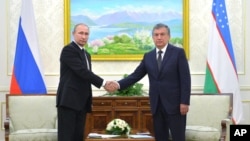Russian President Vladimir Putin on Tuesday urged the successors to Uzbekistan's Islam Karimov to continue his policies – apparent encouragement for them to follow his authoritarian line and keep the lid on opposition at home.
Karimov, who died September 2 at age 78 after more than quarter of a century at the helm, presented himself as a bulwark against a possible surge of Islamist militancy in his Central Asian state which borders Afghanistan.
His tough anti-Islamist line enabled Karimov to maneuver successfully between Russia and the United States, despite strong criticism by rights groups and misgivings among Western governments over his strong-arm tactics against dissenters at home.
"Of course, we hope that everything Islam Abduganiyevich [Karimov] had started will be continued," Russia's Rossiya-24 channel showed Putin telling Uzbek Prime Minister Shavkat Mirziyoyev during a visit to Uzbekistan.
"On our part, we will do everything to support this path of mutual development and the people and leadership of Uzbekistan.
"You can fully count on us as your most reliable friends," said Putin, who flew to Uzbekistan from China, where he attended the G-20 summit.
The Kremlin said in a brief statement that Putin visited Karimov's hometown of Samarkand, where the Uzbek leader was buried, and laid flowers on his grave together with Mirziyoyev.
Prime Minister Dmitry Medvedev represented Russia at the funeral of Karimov, who died of a stroke.
The follow-up visit by Putin, which took place shortly after a senior U.S. diplomat visited Uzbekistan, highlighted the competition among world powers, including China, for influence in resource-rich and strategically located Central Asia.
Hours before Putin's arrival, Daniel Rosenblum, the U.S. State Department's deputy assistant secretary for Central Asia, told reporters in Tashkent he had met with Uzbek Foreign Minister Abdulaziz Komilov the previous evening.
Putin's meeting was seen as a further strong hint that Mirziyoyev, 59, is likely to succeed Karimov as head of state.
Last week, he was appointed head of the commission that organized Karimov's funeral, a duty that in the region's Soviet culture normally falls to the successor. Mirziyoyev, in turn, told Putin his visit "says a lot."
"Our external political relations with the Russian Federation are those of strategic partnership, and we will continue to develop that bridge which you had been building together with Islam Abduganiyevich for so many years in order not to break it, but to further solidify it," he said.
Karimov distanced Uzbekistan from Moscow in 2012 when Tashkent suspended its membership in the Russia-led Collective Security Treaty Organization, which groups several ex-Soviet nations and is seen by some analysts as a regional counterbalance to NATO.
But Uzbekistan, the region's most populous nation, remains heavily dependent on Russia economically. At least 2 million Uzbeks are estimated to work abroad, mostly in Russia, to provide for their families.











